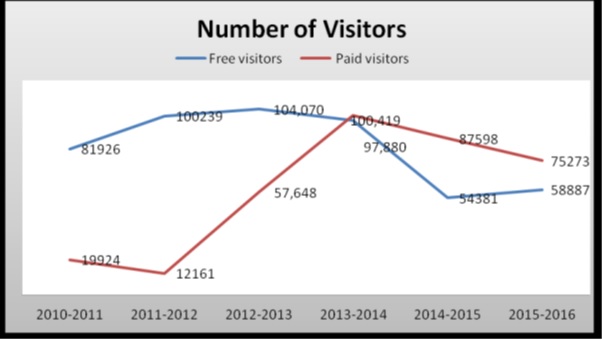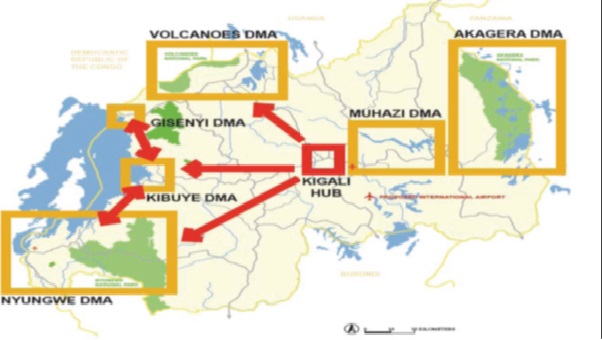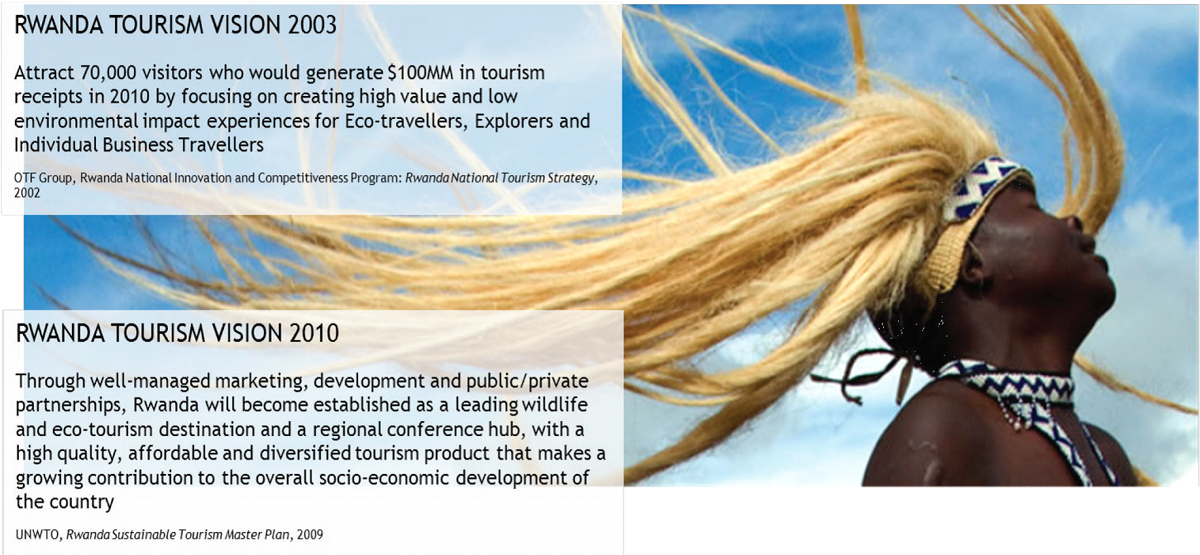I. Executive summary
The promoter of project for the development of community ecotourism in is the Action for the Development of Community Ecotourism (ADEC in French abbreviation). The goal of the project which is in some aspects consonant with the regional policies and intentions aiming at the diversification of tourist products is to contribute to the promotion of community ecotourism by devising all forms of tourist attractions within communities and to make them the catalysts of socio-economic development of populations around National parks and lakes, protected areas in Rwanda concerned by the project. The project will use participatory approach to involve local communities but due to inherent local inabilities, the project will resort to donors financial interventions. The local participation will include namely the folklore dancers, ex-poachers, and other members of local communities. The sustainability of the project is rooted first in the firm determination of the promoter to contribute, by all means, to community ecotourism development. Second, the project is planned in the perspective of many actors at national and international level to uphold actions in harmony with sustainable goals (SDGs). Lastly, certain activities of ADEC members will generate income benefiting local communities. These include cultural activities, artistic activities, etc.
II. Regional context and problem analysis with focus to Rwanda
II.1. Tourism and Non-Governmental Organizations
For long time however, the civic partnership such as non-governmental organizations (NGOs) have proven to be real help and can play positively about the tourism concerns , namely the community tourism (Williams, 1998; Mason, 2003; MINISCOP, 2016). It is the NGOs that have initiated the community tourism on the globe. The history of community tourism goes back in France in 1875 before expanding first to other European countries such as Netherlands in 1885 and second to the rest of the world. The role of the civic organizations was to promote towns and assist the tourists. Although tourist activities of civic organizations are today regarded as activities for destination management areas, their overall role consists in search and provision of whatever services needed by tourists. Indeed, it is what is recommended by the World Tourism Organization .
In Rwanda the legal provisions for the existence of non-governmental organization are guaranteed by the national constitution, first by the law No 20/2000 of 26/07/2000 relating to the existence of not-for-profit organizations abrogated and replaced by the law No 55/2008 of 10/09/2008 regulating non-governmental organizations. The registration of a non-governmental organization in Rwanda requires inter alia having at least 3 members, present its objectives and an action plan before the local authorities where it intends to set its headquarters. The action plan must detail financial methods with which the organization will use to reach its objectives. It is required to provide a nominative list of its members and their signatures. The decision of provisional license is given within 3 months from the submission date. As for the legal personality, it is granted by the Minister of Justice having NGOs in his/her attributions. It is obtained through ministerial order communicated to the representatives of the associations within six months from the date on which the application has been deposited.
II.2. Problem analysis
In Rwanda tourism has proven to be not only an engine gor economic developement but also an enhancing mechanism for social development. The Rwanda tourism policy is centered on the promotion of tourism, the improvementof tourist attractions, the development of tourist infrastructures, the nurturing of entrepreneurial spirit and the encouragement of the quality standards in hospitality sector (UNCTAD, 2014; Kabera, 2017). However, despite those eminent hightened intentions, the concrete actions for the diversification of tourist poroducts remains illusion and the only hospitality actions are ladden with data relating to revenues and statistics on Rwanda’s monolithic tourism (Goriallas and consort). They concern only statistics on the increase of baby gorillas (from 305 in 2014 to 312 in 2015), on hotel infrastructures ( from 8,003 in 2014 to 9,806 in 2016), the arrivals on the aeports (from 67,871 in 2014 to 88,184 in 2016) . Still worse, the problem get aggravated by the absence of operationalization of possibilities meant to create the favorable environment for entrepreneurship allowing the development of local capabilities and potentialities as well as the nurturing of the behavior consonant with the adequate community development . It has been reported by the Institute of National Museum of Rwanda (INMR) that despite the potential and profitabililty of community tourism, the ad hoc progress recorded are deceiving. As an instance, the visits to the museum have been decreasing from 2010 to 2016 . The following figure depicts the situation.

Figure 1: Number of visitors to National Museum of Rwanda
Source: (MINISCOP, 2016, p. 19)
Obviously and despite the governement intentions of making tourism an instrument for social development as well as the nurturing of the community entrepreneurship through the improvement and multiplicatiion of tourist attractions alongside the encouragement of quantity and quality of tourist infratsructures, nothing real appears to be reported regarding community tourism. It is oftetimes the intentions and assumptions without real reported results. Hence, this project intention is to deal with those shortcomings and try to operationalise those noble intentions oftentimes expressed. We can logically deduce that the liaison and marketing activities suffer from notable inadequacy.
III. The goal and objectives of the Project
The goal of the project which is in some aspects consonant with the regional policies and intentions aiming at the diversification of tourist products is to contribute to the promotion of community ecotourism by devising all forms of tourist attractions within communities and to make them the catalysts of socio-economic development of populations around National parks and lakes, protected areas in Rwanda by the project.
The specific objectives deriving from the goal are the following:
⦁ To serve as liaison between Rwanda Development Board (RDB), and the local communities of Rwanda
⦁ Protection of mountains gorillas as well as other protected species by educating local population on the importance of those protected animal species ;
⦁ Promote the cultural tourism within Rwanda communities ;
⦁ Make profit from local tourist attractions through marketing and advertising ;
⦁ Promote tourism entrepreneurship within the communities of Rwanda.
⦁ Promote nature conservation activities within Rwanda by the project ;
⦁ Promote the development of community organizations.
IV. The activities of the project

⦁ Identification of tourist sites all over Rwanda, through national and regional development plans ;
⦁ Advocacy towards Rwanda Development Board, for the construction and rehabilitation of tourist sites that have been identified ;
⦁ Conduct marketing research appropriate to each identified tourist sites ;
⦁ Perform campaign of marketinmg activities for each identified tourist sites ;
⦁ Assist and guide community tourists ;
⦁ Make census of ex-poachers in the areas of operations ;
⦁ Regrouping the ex-poachers into commmunty organizations ;
⦁ Make census of tourism entrepreneurial potentialities in the areas of operations ;
V. Project methodology
The project will use participative approach for the local communities and due to inabilities inherent to local possibilities; the project will resort to financial interventions of donors. The participation of local communities will include mainly folklore dancers, the ex-poachers and other members of local communities.

Figure 3: Rwandese folkloric dancer
Source: (Kabera, 2017, p. 23)
The participation of local communities will be based on
volunteering and benevolence. However, ADEC will organize and do everything
necessary to ensure and pay salaries to workers and employees.
VI. Sustainability of the project
The sustainability of the project is rooted first in the firm determination of the promoter to contribute, by all means, to community ecotourism development. Second, the project is planned in the perspective of many actors at national and international level to uphold actions in harmony with sustainable goals (SDGs). Lastly, certain activities of ADEC members will generate income benefiting local communities. These include cultural activities, artistic activities, etc.
Bibliography
Kabera, C. (2017). Entrepreneurialism in Tourism and Economic Growth in Rwanda: Challenges for Policy Formulation . Amsterdam : VU University .
Mason, P. (2003). Tourism Impact, Planning and Management . Burlington : Butterworth-Heinmann.
MINICOM . (2009). Rwanda Tourism Policy . Kigali: Government of Rwanda .
MINISCOP. (2016). Five Years Strategic Plan for the Development of Cultural Tourism 2017-2022. Kigali: Government of Rwanda .
NISR. (2018). Statistical YearBook 2017. Kigali: Government of Rwanda .
RDB. (2012). Rwanda Skills Survey 2012. Kigali: Government of Rwanda .
RDB. (2018). RDB Annual Report 2017. Kigali: Government of Rwanda .
Republic of Rwanda . (2009). Sustainable Tourism Development Master Plan for Rwanda . Kigali: Government of Rwanda .
UNCTAD. (2014). Services Policy Review: Rwanda. Washington : United Nations .
Williams, S. (1998). Tourism Geography . London : Routledge .
World Travel & Tourism Council. (2018). Travel & Tourism Economic Impact 2018. Retrieved December 2, 2018, from World Travel & Tourism Council Web Site : http://www.wttc.org